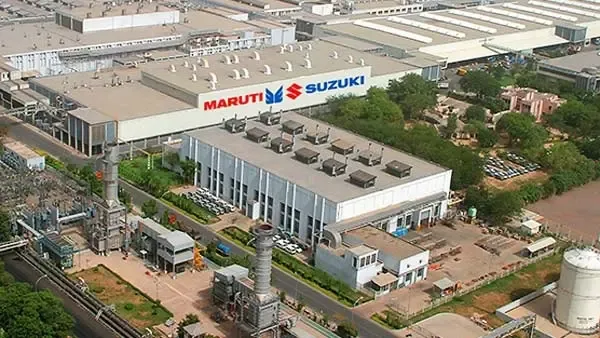Did Maruti Suzuki India’s Q2 net profit really rise by 8%?

Synopsis
Key Takeaways
- Maruti Suzuki's net profit increased by 7.94%.
- Total revenue rose by 13% year-on-year.
- Production surged by 26% in September 2025.
- EBITDA margin decreased due to rising costs.
- Positive outlook for the automotive sector in FY26.
New Delhi, Oct 31 (NationPress) Maruti Suzuki India Limited, recognized as the largest automobile manufacturer in the country, announced a 7.94 percent increase in its consolidated net profit, reaching Rs 3,349 crore for the September quarter (Q2 FY26). This growth is attributed to a surge in vehicle sales and robust demand trends.
In the same quarter last fiscal (Q2 FY25), the company had recorded a net profit of Rs 3,102.5 crore, as detailed in its stock exchange report.
On a standalone basis, the automaker reported a 7.3 percent rise in profit after tax (PAT), which totaled Rs 3,293.1 crore, up from Rs 3,069.2 crore a year prior.
The company's total revenue from operations also saw a significant increase of 13 percent year-on-year (YoY), amounting to Rs 42,344 crore in the July–September quarter, compared to Rs 37,449 crore in the previous year.
At the operational level, Maruti Suzuki’s earnings before interest, tax, depreciation, and amortisation (EBITDA) reached Rs 4,434 crore, slightly above Rs 4,417 crore from the previous year.
However, the EBITDA margin saw a decline to 10.5 percent from 11.9 percent, impacted by elevated input costs and competitive pricing pressures.
Despite the positive earnings trajectory, shares of Maruti Suzuki India experienced a minor drop, trading at Rs 16,167 on the NSE, reflecting a 0.24 percent decrease from the prior close.
Earlier this month, the company reported a 26 percent rise in production year-on-year for September 2025, reaching 2,01,915 units, driven by increased market demand and the introduction of new models.
Production of utility vehicles, including the Brezza, Ertiga, and Fronx, surged by 27 percent, while compact models such as the Baleno, Swift, and Dzire also displayed robust output growth.
As the Indian automobile industry moves into the latter half of FY26, analysts project consistent performance bolstered by festive demand, GST rate reductions, rural recovery, and new launches.
According to Axis Securities, while two-wheelers and commercial vehicles are experiencing strong momentum, passenger vehicle sales are expected to show high single-digit growth in the upcoming months.









